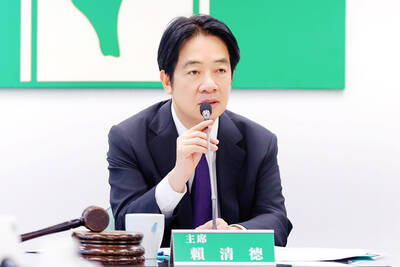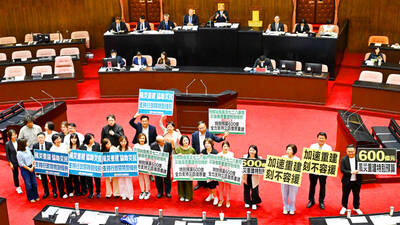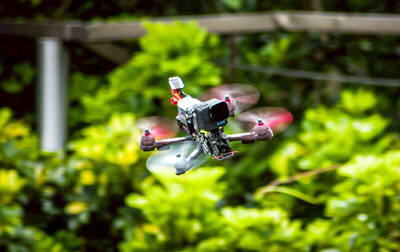North Korea kept the world guessing yesterday as the first day of a scheduled five-day satellite launch period passed without blast-off.
Officials in Seoul and Tokyo speculated that adverse weather caused Pyongyang to delay what the US and its regional allies see as a disguised ballistic missile test.
“The prediction of a launch today had seemed quite plausible but the weather conditions seemingly were not that good at the launch base,” an unidentified official told Yonhap news agency.
In Tokyo, senior Cabinet official Kyoji Yanagisawa said: “We can imagine strong winds or some troubles with equipment, but we have no information at all.”
South Korea’s weather agency said skies over the site were cloudy yesterday, with winds that would abate today.
Yonhap, quoting a government source, said workers had installed cameras at the site and repeatedly opened and closed the cover atop the three-stage rocket.
Nerves were fraying in Japan, which is under the projected flight path. A government crisis center announced at 12:16pm that the rocket was believed to have been launched, but five minutes later retracted its statement as incorrect. The country heaved a sigh of relief.
Pyongyang last month notified world aviation and shipping agencies it would fire the rocket sometime between yesterday and Wednesday between 11am and 4pm. It has said the rocket’s first stage will fall in the sea 75km west of Japan and that the second stage will plunge into the Pacific.
US President Barack Obama urged North Korean leader Kim Jong-il’s regime to hold back.
“We have made very clear to the North Koreans that their missile launch is provocative,” he said on Friday in Strasbourg, France. “Should North Korea decide to take this action, we will work with all interested parties in the international community to take appropriate steps to let North Korea know that it can’t threaten the safety and security of other countries with impunity.”

President William Lai (賴清德) yesterday criticized the nuclear energy referendum scheduled for Saturday next week, saying that holding the plebiscite before the government can conduct safety evaluations is a denial of the public’s right to make informed decisions. Lai, who is also the chairman of the Democratic Progressive Party (DPP), made the comments at the party’s Central Standing Committee meeting at its headquarters in Taipei. ‘NO’ “I will go to the ballot box on Saturday next week to cast a ‘no’ vote, as we all should do,” he said as he called on the public to reject the proposition to reactivate the decommissioned

US President Donald Trump on Friday said that Chinese President Xi Jinping (習近平) told him China would not invade Taiwan while Trump is in office. Trump made the remarks in an interview with Fox News, ahead of talks with Russian President Vladimir Putin over Moscow’s invasion of Ukraine. “I will tell you, you know, you have a very similar thing with President Xi of China and Taiwan, but I don’t believe there’s any way it’s going to happen as long as I’m here. We’ll see,” Trump said during an interview on Fox News’ Special Report. “He told me: ‘I will never do

The Legislative Yuan yesterday approved an aid and recovery package authorizing the government to allocate up to NT$60 billion (US$1.99 billion) for regions hit by Typhoon Danas and subsequent torrential rains last month. Proposed by the Executive Yuan on Aug. 7, the bill was passed swiftly after ruling and opposition lawmakers reached a consensus in inter-party talks on relief funding and assistance for disaster-stricken areas. The package increases the government’s spending cap from the originally proposed NT$56 billion to NT$60 billion, earmarked for repairing and rebuilding infrastructure, electricity systems, telecommunications and cable TV networks, cultural heritage sites and other public facilities.

FLEXIBLE FORCE: Only about 10 percent of small drones reach their target, an expert said, which is why it is important to make it easier to procure large numbers of drones The military is planning to recategorize military drones as “consumables/munitions,” rather than as aircraft, to speed up the procurement process, the army said yesterday. The Army Command Headquarters said the decision was made because drones, like munitions, need to be rapidly replaced, and thus should be categorized as consumables/munitions “to meet the army’s practical needs.” The headquarters’ confirmation came after the Chinese-language Liberty Times (the Taipei Times’ sister paper) early yesterday reported that the army was about to make the classification change based on the example of the US, which is Taiwan’s biggest arms provider. US Secretary of Defense Pete Hegseth announced a